The Indian Union Muslim League (IUML), a Kerala party that has four lawmakers in Parliament, on Thursday challenged the contentious changes to the Citizenship Bill in the Supreme Court, arguing that the law was unconstitutional and should be struck down. The petitioners have also filed a separate request urging the top court to stay the legislation that cleared its Rajya Sabha test last evening.
Once the law cleared by Parliament gets presidential assent and comes into effect, all non-Muslims who migrated to India from Afghanistan, Pakistan and Bangladesh before 31 December 2014 would be entitled to get Indian citizenship on the grounds that they faced persecution back home.
Many opposition parties led by the Congress had voted against the legislation in Parliament, arguing that it violated constitutional guarantees of equality. Home Minister Amit Shah had, however, argued that the constitution provided for reasonable classification to fast-track citizenship requests from these refugees.
The petition by IUML - its four lawmakers also are petitioners - argued that the new changes cleared by Parliament discriminate on the basis of religion.
“The amendment seeks to segregate persons on the basis of their religion and grant them the benefit of naturalization, if they belong to a certain religion, in this case Hindus, Sikhs, Buddhists, Jains, Parsis and Christians,who are from Pakistan, Afghanistan and Bangladesh,” the petition said.
“This religious segregation without any reasonable differentiation, not only violates Article 14, but is also blatantly opposed to the very basic structure of the Constitution and to the very idea of India as a country which treats people of all faiths equally,” it said.
It also underlined that there were other religious minorities in the three countries which have been excluded such as the Ahmadiyyas, Shias and the Hazaras who had a long history of persecution in Afghanistan and Pakistan and still continue being persecuted.


